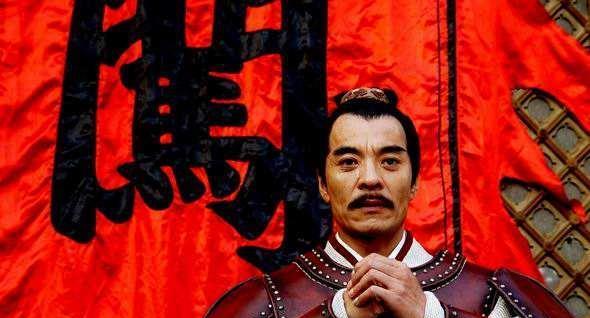In the seventeenth year of Chongzhen, Li Zicheng, on his way to Beijing, issued the famous "Edict of the First Year of Yongchang", which contained a sentence that was worthy of scrutiny and playfulness - "Junfei is not very dark".
If we compare Li Zicheng's edict with Chongzhen's sixteenth year of his "Suppression of Soldiers and An Min" issued by Chongzhen, it is not difficult to find that Li Zicheng's state of mind has changed significantly.

Lee Zicheng stills
Li Zicheng sent a signal to the Chongzhen Emperor
It is said in the "Suppression of Soldiers and An Min" that "the ming monarch was not benevolent", which shows that Li Zicheng directly assigned all the responsibility for the decadent rule of the ming dynasty to the monarch Chongzhen Emperor, and his words were very sharp, and the accusations were also full of vigor.
After comparison, we can find that the "Edict of the First Year of Yongchang" has actually come to a "obvious regression". Not only did it not forget to reveal the contradictions of society, but it also sent a signal to the Chongzhen Emperor that there was some possibility of communication between us.
Not only that, it is said that after Li Zicheng captured Beijing, he even cried for the Chongzhen Emperor. Similar records are found in the Records of Yansui Town, the Records of Jiashen Transmission, and the Reading of the World. Based on these historical materials, we can infer that Li Zicheng may have the intention of "dividing the world" and "sharing the country" with Chongzhen.
Li Zicheng has the ideological basis of "rich and noble will return to his hometown."
Li Zicheng carried out an unreasonable policy in Beijing, and he did nothing to stabilize the situation and consolidate the victory. He suffered a lot of losses in the "Battle of Shanhaiguan", but for him, the situation at that time was not a hopeless situation, because the Dashun regime still had at least hundreds of thousands of troops to put into the battle, and it still had a certain advantage in any aspect.
It can be seen from this that as long as Li Zicheng sticks to Beijing and stabilizes his position, the situation is completely reversible. But Li Zicheng had no intention of beijing, and he insisted that "Shaanxi, my parents and the country also." It was precisely for this reason that after Li Zicheng suffered a minor setback at the Battle of Shanhaiguan, he sent people to Wu Sangui's army to negotiate peace.
Wu Sangui stills
Wu Sangui demanded that "the crown prince and the second king should leave the capital as soon as possible", and as a result, Li Zi set up a horse to "serve the prince to the army of Sangui, and ask each of them to stop the war". This shows the urgency of Li Zicheng's mentality of wanting to negotiate peace.
Since Li Zicheng had the ideological basis that "riches and nobles must return to their hometowns," we have every reason to believe that when Li Zicheng was in the seventeenth year of Chongzhen, when Li Zicheng's soldiers came to Beijing, it should be true that he "negotiated peace" with the Chongzhen Emperor.
The negotiation process between Li Zicheng and the Chongzhen Emperor
It has been clearly recorded in the literature that Li Zicheng sent emissaries to "negotiate peace" with the Chongzhen Emperor. In the "Records of the Liukou of Huailing", it is said: "If you want to cut off the northwestern region, you will be crowned king, and you will reward the army with millions of silver and retreat to Henan." If the Chongzhen Emperor agreed to these conditions, Li Zicheng stated that he was "willing to retire from the group of thieves in the imperial court after receiving the title, and to control Liaoshen externally, but not to be summoned to the court."
There are many historical books that can be used as evidence for this historical record, so it should be said that it is not a figment of the imagination. Based on the records of the various books, we can deduce that the negotiation process between Li Zicheng and the Chongzhen Emperor is roughly as follows:
On March 17, 1777, when Li Zicheng was approaching the city, he set up a posture under the Guang'an Gate in Beijing and sent people to shout to Chongzhen's side: "You send someone, let's talk!" After shouting for half a day, the city was at a loss.
Why? Because no one dared to play this matter to the emperor. Still the eunuch was reliable, and someone lay down in the emperor's ear to report the matter truthfully. Chongzhen then found a secret platform to summon Li Zicheng's emissaries, and Wei Zaode, the first assistant of the cabinet, was also present.
The messenger conveyed Li Zicheng's three conditions: "I want both fiefdom and money. I can help you in future wars, but I don't recognize you as emperor, and you don't want to take care of me."
Chongzhen smiled and giggled, and with three words in his heart, he said to Wei Zhaode, "What the hell?" Now a hundred thousand hot, you decide! But Wei Zaode didn't dare to make a fool of himself, so he was silent.
Chongzhen fidgeted and repeatedly urged Wei Zaode, but Shoufu never said a word. Chongzhen had already burned his eyebrows, so he had to harden his scalp and say, "The plan is determined, and there is a purpose and a seal", so he sent the messenger back. It can be seen that Chongzhen clearly agreed to the conditions for giving Li Zicheng a fief.
Chongzhen stills
What is the plan in Chongzhen's mouth? On the night of March 18, Chongzhen climbed Jingshan Mountain, saw the flames in the sky, sighed and sighed, and wandered speechless. At dawn on March 19, Chongzhen thought in his heart: Then I will still die. Finally, he found a crooked neck tree and hanged himself.